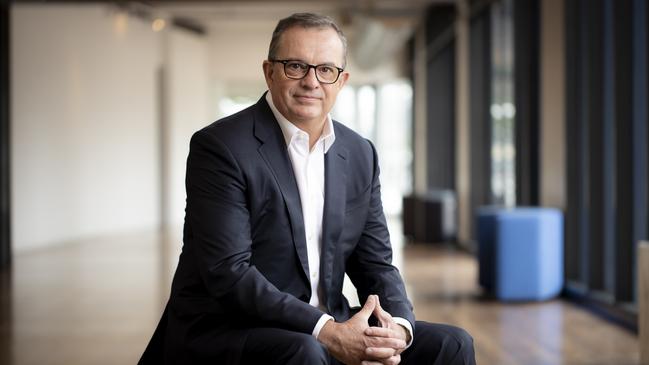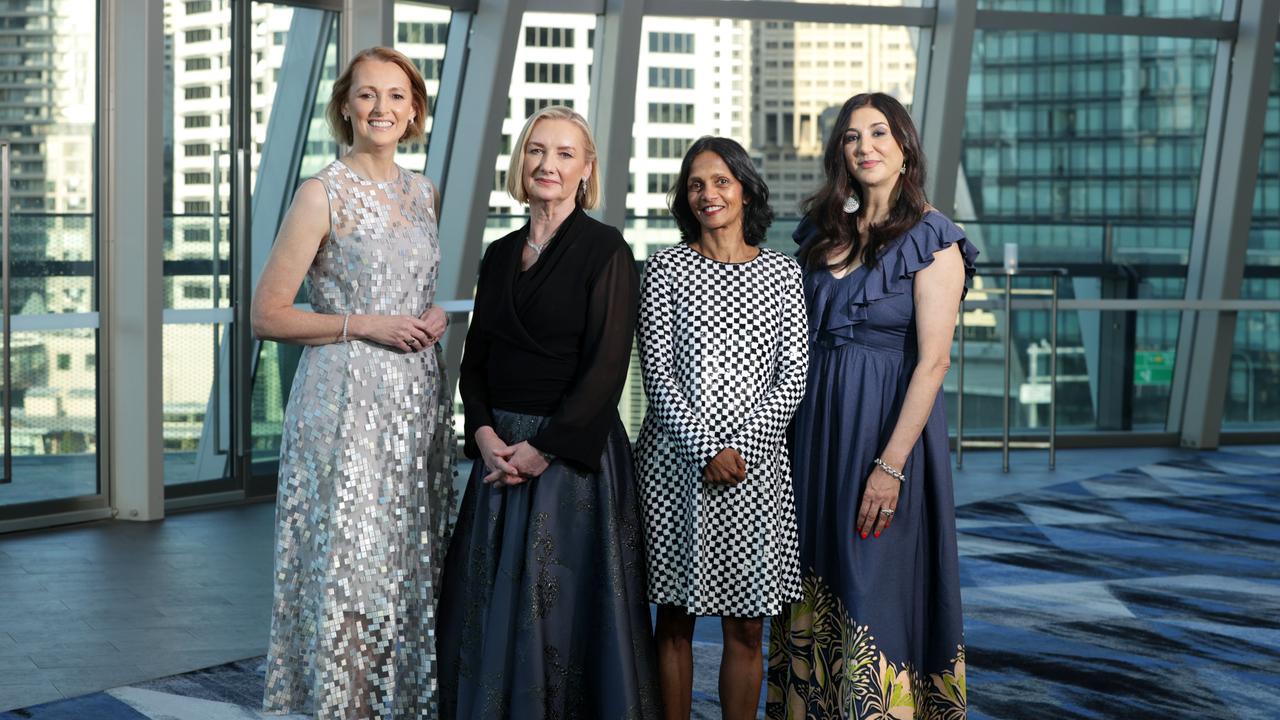With the super wars over, this Insignia Financial boss is planning for peace
Scott Hartley is the straight-talking wealth boss who wants to change the view of financial advice.

Business
Don't miss out on the headlines from Business. Followed categories will be added to My News.
Wealth boss Scott Hartley says the lack of access to quality financial advice is now a massive problem for middle Australia.
Advice is becoming too expensive for the wave of people moving closer to retirement and many are being forced to go online to find their own answers. However, and after years of big promises, artificial intelligence is on the cusp of getting tailored financial advice in front of more people, Hartley says.
Hartley is the straight-shooting wealth boss who just took charge of one of the nation’s biggest network of advisers as well as $300bn sitting on its funds management and platforms, the ASX-listed Insignia Financial.
Hartley, who took charge of Insignia this month after running AMP’s wealth arm, has worked on both sides of the cultural fence.
He was also the former boss of Queensland’s industry fund Sunsuper (now part of Australian Retirement Trust).
Hartley says we have to move on from the never-ending super wars between the industry funds and their for-profit rivals that spent much of the past two decades taking pot shots at each other rather than helping customers.

“I think we can absolutely coexist,” Hartley says of industry and retail funds. “Competition is good. More competition leads to innovation, which leads to better outcomes for customers.”
It’s fair to say most people don’t know the newish brand Insignia. The $1.5bn wealth company is the result of a rushed three-way merger that has seen it move from being mid-sized wealth player IOOF to now owning two of the biggest wealth brands spun out by the major banks. Since 2020 it has been digesting ANZ’s OnePath as well as MLC, the premium brand from National Australia Bank. It has an adviser network of more than 1200, putting it just behind AMP.
Speaking to The Australian in Insignia’s Sydney office just weeks after taking the top job, Hartley says one of the unintended effects of cleaning up the advice industry has been increasing regulations, and compliance and structures built up over the years, which means advice has been increasingly for the wealthy.
Statements of advice can run into 100 pages, and compliance is time-consuming. The number of advisers across the industry has halved since the first round of big reforms, the Future of Financial Advice, was introduced.
“Many of these were probably substandard advisers – and that needed to change,” he says.
“But today, the problem is there’s nowhere near enough advisers to be able to serve and their cost to serve is so high.”
In December Financial Services Minister Stephen Jones outlined a package giving super funds a bigger role in providing basic advice without the heavy statements of advice. This was in response to the recommendations from the Quality of Advice Review led by Allens partner Michelle Levy. While the proposal plays into the hands of industry super funds, brands like Insignia’s MLC also benefit.
Hartley also firmly believes technology is going to be the answer to allow physical advice to scale effectively. “You can reduce the cost to serve and advisers get to see more customers and be able to do things more efficiently.”
Despite the evolution of “Robo” or AI-based advice in providing accessible financial advice, Hartley says there will always be a need for a real adviser to be part of the process.
“People just don’t trust algorithms,” he says.
The government too is pushing wealth managers and super funds to work harder in looking after members during the retirement phase, including having a sustainable income. Hartley says this is the real challenge to Australia’s retirement bulge, but says it can’t be simply about selling another product to those people moving closer to retirement. “Product is never the answer,” he says.
He says it’s about guidance and advice and then the product that comes out of that.
Hayne shake-up
Hartley has seen the industry from both sides as he moved from MLC to run Queensland industry fund Sunsuper. He joined AMP as head of wealth after its royal commission implosion and was the lead internal contender to take charge after Francesco de Ferrari left, although to job later went to ANZ executive Alexis George.
The Hayne royal commission skewered the financial advice industry and AMP especially. Hartley was running Sunsuper at the time. He believes that Hayne accelerated the separation of wealth products from advice.
“If anyone was under any illusion, prior to the royal commission, that vertical integration was going to be a good business model going forward, they certainly weren’t after the royal commission,” he said.
Indeed, much of the work he later did at AMP involved untangling product from AMP’s advice arm.
Hartley believes both product and advice can still exist inside a single business. “You’ve got to govern them,” he says. “Advisers need to be free to choose what’s in the best interest of their clients, choose the platforms that work best for their business.”

Nor does he see banks getting back together with wealth management. “At a conceptual level, you can argue they’re similar, but they’re very fundamentally different,” he says.
Super funds have a fiduciary duty to customers, whereas banks are selling products. And given wealth businesses never met the lofty profit expectations of banks but were the source of regulatory headaches, banks stopped investing in them.
“They were quite incompatible,” he says.
Insignia has taken the long and at times rocky road to get where it is today. The former friendly society IOOF demutualised two decades ago with a market value of $150m, but long struggled to find its place between the big wealth managers of AMP or Axa Asia Pacific as well as each of the major banks. It settled on building up the back end, including investing in wealth platforms.
Three into one
Following the shock of the royal commission, where IOOF’s governance and ongoing clashes with the regulator were exposed, APRA began legal proceedings against then chief Chris Kelaher and several executives. But APRA’s lawsuit, including attempts to disqualify the executives, quickly collapsed.
IOOF had become a willing buyer of the wealth assets put on the block, including National Australia Bank’s MLC business. The $1.4bn deal meant that a one-time sleepy mutual from Melbourne was the owner of what was long regarded as the jewel among the nation’s wealth players. The deal doubled the size of IOOF overnight. Former boss Renato Mota, who took charge after Kelaher retired, had set about stabilising the wealth player and lifting governance following the Hayne royal commission upheaval.
A long underperforming share price opened the way for John Wylie’s Tanarra Capital to emerge with a near 15 per cent stake. He had been ramping up pressure to move faster on the integration in an effort to boost the share price. The wealth manager had been losing funds and promised integration savings were slipping. Mota flagged his exit last year, with Hartley taking charge at the start of this month.
Hartley acknowledges he has plenty of work ahead as Insignia is pushing ahead on plans to spin out its licensed adviser business into a stand-alone entity, although it will still retain several hundred salaried advisers. Investors remain sceptical it can deliver on the promised savings from the complicated merger. Much of the heavy lifting from the mergers have been done, and Insignia can start shifting attention, away from an internal focus to now looking out.
The bigger ongoing challenge is bringing together the distinct personalities of the very different tribes – IOOF, MLC and OnePath – under one banner. This will come.
“Renato (Mota) did a very good job of really pushing one team, one culture, and we’re still on the journey,” he says.
Hartley says a company like Insignia will rise or fall on its culture.
“It doesn’t matter what your strategy is. It’s all about execution. If your culture and leadership is strong, then you’re able to execute on anything you want to do, essentially”.
Originally published as With the super wars over, this Insignia Financial boss is planning for peace



